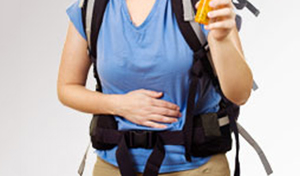Washington, Apr 1: Turns out, antibiotic use for travelers` diarrhoea favours particularly resistant super bacteria, increasing the patients` risk of getting an infection.
 Every year, millions of travellers visit countries with poor hygiene, and approximately one third of them return home carrying antibiotic-resistant ESBL intestinal bacteria. Most of them remain unaware of this, as the bacteria cause no symptoms.
Every year, millions of travellers visit countries with poor hygiene, and approximately one third of them return home carrying antibiotic-resistant ESBL intestinal bacteria. Most of them remain unaware of this, as the bacteria cause no symptoms.
High-risk areas for contracting ESBL bacteria are South and South-East Asia, Africa and Latin America.Diarrhoea is the most common health complaint for people who travel to poor regions of the world.
Those contracting diarrhoea have an increased risk of ESBL acquisition, and if they choose to they treat it with antibiotics, the risk becomes multiplied.
A Finnish study led by Anu Kantele and published two years ago showed that among people travelling to high-risk areas, those contracting diarrhoea and taking antibiotics, up to 80 percent brought ESBL super bacteria home with them.
A follow-up study led by Kantele has now established that antibiotics taken while abroad not only render the tourist susceptible to an ESBL infection, but also lead to the most resistant strains of these bacteria being selected.
"ESBL bacteria are resistant to penicillins and cephalosporins, which is why infections caused by them are treated with antibiotics from other groups, such as fluoroquinolones (e.g. ciprofloxacin).
When we analysed the patients with ESBL more closely, we found that among those who had not resorted to using antibiotics, 37 percent had an ESBL strain resistant to fluoroquinolone.
As for the travellers who had taken fluoroquinolone, 95 percent had a strain of ESBL resistant to fluoroquinolone and, indeed, a variety of other antibiotics. Antibiotic use thus implies selecting ESBL strains with the broadest spectrum of resistance," Kantele explained.Kantele noted, "The finding makes sense.
When we take an antibiotic, the bacteria that survive in our digestive system are those resistant to the treatment.
"Antibiotic resistance can be transferred between bacteria through a package containing a variety of resistance genes, meaning that one package may contain resistance to several types of antibiotics.
Indeed, most fluoroquinolone-resistant ESBL strains were also found resistant to certain other types of antibiotics the resistance to which is known to be transferred in the same gene packages that transfer ciprofloxacin resistance.
"In practice this means that travellers pick up the most resistant strains of ESBL, and we are left with dwindling treatment options for ESBL infections," stated Kantele.The study appears in Travel Medicine and Infectious Disease.





Comments
Add new comment